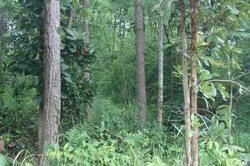ASSESS
There were a number of key factors to this workshop that required careful and sustained assessment to ensure the maximum benefit to both the Students participating in the course Ourselves the facilitators and the project hosting the course.
Om, Matt and I had been discussing the possibility of running a workshop together for several months.
Having lived together at the panya project eco-village and permaculture education project in northern Thailand for several months during 2011 we knew each others strengths and weaknesses very well and had developed very close friendships. We were all excited about taking this relationship one step further and developing it into a powerful and dynamic trio co-facilitating workshops and courses together.
Having identified the desire to co-facilitate a workshop together the next thing was to arrange where the course would take place. This was a relatively easy choice for a number of reasons: We were looking for a venue that could display and embody a living example of applied permaculture design, community / ecovillage living, good educational environment and facilities, competent and reliable support personnel and close proximity to a natural advanced ecosystem, preferably a forest (essential for the deep ecology aspect). These are the choices of venues available:
SWOC analysis: (strengths, weaknesses, opportunities, Constraints)
Om, Matt and I had been discussing the possibility of running a workshop together for several months.
Having lived together at the panya project eco-village and permaculture education project in northern Thailand for several months during 2011 we knew each others strengths and weaknesses very well and had developed very close friendships. We were all excited about taking this relationship one step further and developing it into a powerful and dynamic trio co-facilitating workshops and courses together.
Having identified the desire to co-facilitate a workshop together the next thing was to arrange where the course would take place. This was a relatively easy choice for a number of reasons: We were looking for a venue that could display and embody a living example of applied permaculture design, community / ecovillage living, good educational environment and facilities, competent and reliable support personnel and close proximity to a natural advanced ecosystem, preferably a forest (essential for the deep ecology aspect). These are the choices of venues available:
SWOC analysis: (strengths, weaknesses, opportunities, Constraints)
Pun PunStrengths:
Weaknesses:
Opportunities:
Constraints:
|
Wongsanit AshramStrengths:
Weaknesses
Opportunities:
Constraints:
|
The Panya ProjectStrengths:
Weaknesses:
Opportunities:
Constraints:
|
Rak TamachatStrengths:
Weaknesses:
Opportunities:
Constraints:
|
Next we contemplated when the course could realistically happen

Om Matt and I all have busy schedules with different commitments in far flung regions so coordinating a time that was suitable for all of us took a bit of work. There was also the consideration of fitting it into the schedule of the project that we chose as the host venue.
In this case we chose The Panya project as we saw it as the place that best fulfilled our goals holistically. Panya is an education centre and host quite a lot of courses so we had to communicate with the team there to find a time that worked well for them and for us.
Finally we came up with the date (17th - 31st October 2012).
So the next task was to consider: what are the key elements that we wanted to focus on during this workshop?
We knew that we wanted to cover an introduction to permaculture; giving participants a good grounding in the ethics and principles of permaculture and introducing permaculture as a design tool.
We also knew that we wanted to cover aspects of community living. Introducing them to life in community, how to build trust and harmonizing interactions in a community context.
Given Om's considerable experience facilitating ecovillage design education (EDE) courses in Thailand and Matt, Marta and I's interest in the subject we also wanted ecovillage education to be a large focus of the course.
Finally we all had a strong desire to incorporate more of a spiritual / philosophical aspect to the workshop. Attempting to transcend paradigms and get folks thinking on a deeper level. Trying to put permaculture and human relationships with nature into their proper context on a level more elevated than the mundane. Om has a lot of experience at facilitating deep ecology sessions during EDE courses and after learning more about the subject and reading a couple of Joanna Macy books I felt an instant and deep connection and attraction to the subject, Matt was also very excited about it.
We felt that all these elements were intertwined and interconnected and could be combined very well together to create a powerful course.

